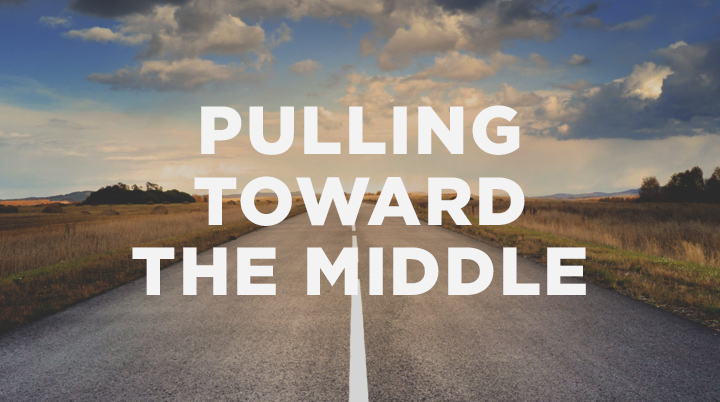Latest
-
Objections to the Christian Faith from the Unchurched and De-Churched
 Tue Dec 02, 2014
Tue Dec 02, 2014
by Resurgence -
Craig Groeschel: We Innovate for Jesus
 Tue Oct 14, 2014
Tue Oct 14, 2014
by Resurgence -
Mark Driscoll: Revelation
 Tue Oct 07, 2014
Tue Oct 07, 2014
by Resurgence -
RESURGENCE LEADERSHIP #034: JOHN PIPER, WHY I TRUST THE SCRIPTURES, PART 2
 Tue Sep 30, 2014
Tue Sep 30, 2014
by Resurgence -
Resurgence Leadership #033: John Piper, Why I Trust the Scriptures, Part 1
 Tue Sep 23, 2014
Tue Sep 23, 2014
by Resurgence

Archives
Pulling Toward the Middle: Why We Must Stop Demonizing Those Who Disagree

There is something within us that loves to take a side on polarizing issues and make that our identity. But could Jesus be calling us to the middle?
When we are passionate about an element of the Christian faith, we tend to elevate it above all else, which can get us into some real trouble. The warning sign is when I hear someone declare, “Well in my ministry...” That’s why much of what I do as a pastor in counseling, advising, or mentoring is to try to pull my congregation towards the middle of certain issues.
As we survey our culture, we often see a battle between two sides of an issue: pro-choice or pro-life? Conservative or liberal? Small government or big government? This also plays out in the churches we are part of: Arminian or Calvinist? Cessationist or charismatic? Social gospel or preached gospel?
A false identity
There is something within us that loves to identify completely with a particular side of these issues. It helps us feel we belong to something, and it gives us a purpose and an identity. There can be a fear that if we do not fully buy into our “side,” we are being fake.
Sadly, identifying with only one side of an issue causes us to demonize those on the other side. This happens when we idolize our current position on a topic and place our connection with that side above our identity as Christians. We are no longer Christians; we become “liberal Christians,” “conservative Christians,” or whatever. In our desire to be accepted by our side we have forgotten that we were all bought with the blood of Jesus.
When we are passionate about an element of the Christian faith, we tend to elevate it above all else.
I don’t believe that everyone who calls themselves a Christian is one. There are wolves and heretics out there, but within the bounds of orthodox Christianity there is a middle ground that must be fought for. It is the ground where we meet on the thousands of things we agree upon rather than dividing on the few things we do not.
Jesus’ call to the middle
In the Gospels, Jesus engages with both sides of first-century Judaism: on one side, the conservative Pharisees, and on the other, the liberal Sadducees (Acts 23:8). What does Jesus do in his challenges to them? He calls them to leave their polar views and engage with him in the middle (Matt. 16:1–4). Whether it is his attacks on the legalistic dead hearts of the Pharisees or the way he cuts through the foolish questions of the naturalistic Sadducees, he calls each of them to repent and believe in the Kingdom.
Sadly, identifying with only one side of an issue causes us to demonize those on the other side.
The call of Jesus to the middle ground is one where there is an uncomfortable breadth of inclusiveness. The Kingdom of God is always presented as a wide hope, far bigger than we are naturally comfortable with. If all of God’s creation is being redeemed (Rom. 8:18–23), then all of our thoughts, all of our culture, and all of our views are being redeemed too.
Finding unity in Christ
So, as I lead and challenge those whom I shepherd, I am aware that calling them in from their extremes and into a trust of Jesus is often the best course of action. Jesus is often firmly planted in the middle between our sides—between liberal and conservative; between promoting God’s sovereignty and recognizing human responsibility; between the call to preach the gospel and the call to live the gospel; between calling others to repent of sin and being a friend of sinners.
The Kingdom of God is always presented as a wide hope, far bigger than we are naturally comfortable with.
Do you find yourself on one side of a particular issue? Might Jesus be asking you to respectfully engage with, care for, and treat those on the other side like brothers or sisters in Christ?
I pray that we might find a depth and breadth of unity within the body of Christ as we seek Jesus and answer his invitation to meet him in the uncomfortable middle.